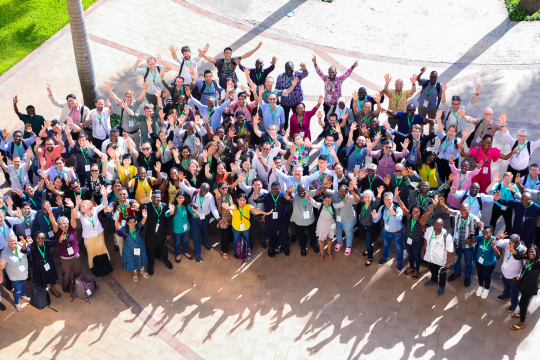EfD’s 17th Annual Meeting in Accra, Ghana, once again showed why it’s claimed to be the biggest and best conference on the application of environmental economics in the Global South since it encompassed an entire week of courses, plenaries, research presentations, and collaborative meetings involving around 200 people from all over the world.
The actual Annual Meeting, October 5 – 8, featured seven keynote presentations, 38 parallel sessions with 121 research presentations, and open sessions with EfD’s seven collaborative programs. All the key EfD committees (Research, Capacity Development, Collaborative Program, Coordination) and the Advisory Board also took the opportunity to meet.
In addition, there were three courses and a policy day conducted during the three days preceding the Annual Meeting itself.
IGE teamed up with SETI
The Inclusive Green Economy in Practice Program (IGE) had a three-day workshop where 25 civil servants from five countries in East Africa met with 20 researchers from the EfD network, especially from the Sustainable Energy Transitions Initiative (SETI). The IGE program has a focus on green energy transition this year, and more specifically, policies to reduce biomass dependency. Teaming up with SETI is a perfect match to ensure that the participants, the IGE Fellows, have access to the best and most relevant research in this field.
Training for policy impact
There was also a two-day training session for 24 researchers from the EfD centers on Policy Engagement and Science Communication. The participants had already met online on five occasions prior to this session. Meeting in person was an opportunity to take part in presentations, showcase their own work in the field, learn from successful policy engagement cases, discuss challenges and opportunities to be more successful, and thereby build a community of practice within EfD for greater policy impact.
Gender was highlighted
The EfD Early Career Fellowship program also took the opportunity to meet for a three-day course on Gender Analysis in Development Economics. The 19 early career researchers from the EfD network discussed the concept of gender and its relevance to research, equipping themselves with methodologies to analyze gendered impacts.
The pre-meeting sessions also included a Policy Day at the University of Ghana. This was an opportunity to highlight the important work of EfD Ghana in contributing to the implementation of policies for a sustainable fishing industry. Several senior civil servants and other stakeholders, including the Deputy Minister of Fisheries and Agriculture attended, as well as researchers from the EfD network.
Fruitful dialogues with policymakers
EfD Director, Gunnar Köhlin, noted that "the very influential dialogue between researchers and policymakers when it comes to fisheries management in Ghana was a common thread throughout the week".
Wisdom Akpalu presented his experiences from these policy dialogues as part of the Policy Engagement and Science Communication course. This was also the theme of the policy day, where the speech by the Deputy minister showed his great appreciation for the contributions of the EfD Ghana research team to the improvements of Ghanaian fisheries policies. Finally, at the award dinner, Wisdom Akpalu received the EfD Impact Award, as a recognition of the influence that the team has had not only on policy but on the people of Ghana.
By: Petra Hansson
